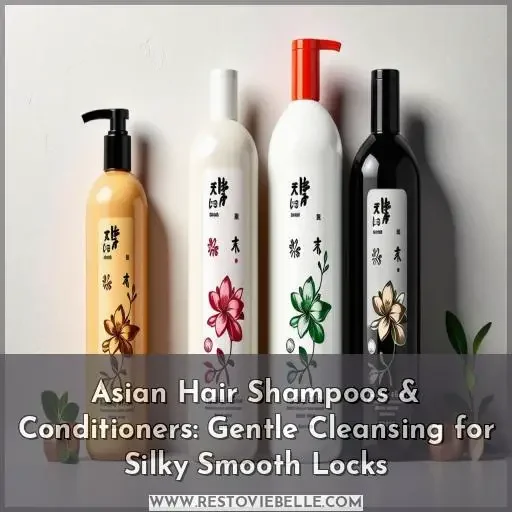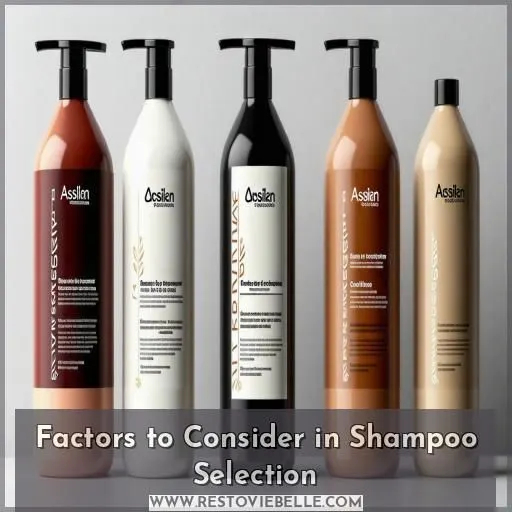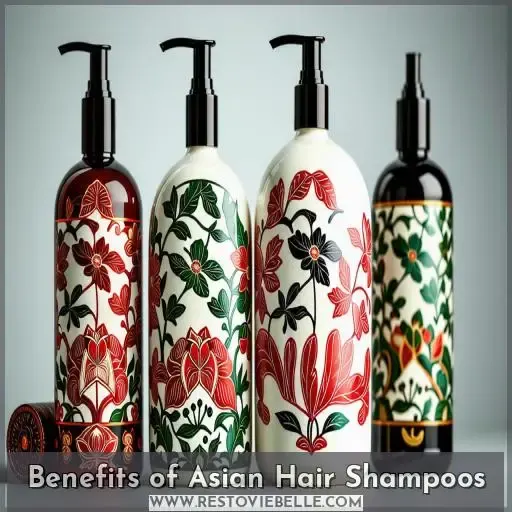This site is supported by our readers. We may earn a commission, at no cost to you, if you purchase through links.
 You’ll want to seek out Asian hair shampoos and conditioners designed for your delicate strands.
You’ll want to seek out Asian hair shampoos and conditioners designed for your delicate strands.
These gentle formulas use natural ingredients like camellia oil and green tea to gently cleanse while boosting shine and smoothness.
Asian hair products are designed to address common concerns for your hair type, such as damage, frizz, and thinning.
By maintaining your hair’s ideal moisture balance, you can enjoy silky, manageable locks.
And trust me, once you discover how these shampoos nurture your hair’s health, you’ll be keen to explore their benefits further.
Table Of Contents
- Key Takeaways
- Factors to Consider in Shampoo Selection
- Benefits of Asian Hair Shampoos
- Frequently Asked Questions (FAQs)
- What is the best Asian shampoo?
- What hair products do Asians use?
- What shampoo do Japanese use?
- Which shampoo is most used in Korea?
- How often should I wash my Asian hair?
- Can shampoos promote hair growth for Asian hair?
- Do all Asian hair types require the same shampoo?
- What ingredients should I avoid in Asian hair shampoos?
- How do I know if a shampoo is suitable for my Asian hair type?
- Conclusion
Key Takeaways
- Girl, it’s time to let go of those one-size-fits-all hair products and embrace the goodness of Asian shampoos – they’re like a warm hug for your delicate strands.
- These gentle formulas are packed with natural ingredients like camellia oil, green tea, and rice water, nourishing your locks and leaving them silky-smooth. It’s like having a personal hair stylist whispering sweet nothings to your tresses.
- Kiss frizz, damage, and thinning goodbye! Asian shampoos are designed to address all your hair woes, leaving you with a mane that’s so luscious, you’ll want to take a million selfies.
- Don’t just take my word for it, babe! Once you experience the magic of these shampoos, you’ll be hooked. Prepare to become the envy of all your friends with your newly discovered hair secrets.
Factors to Consider in Shampoo Selection
When selecting an Asian hair shampoo, you’ll want to account for your hair type and texture, whether your scalp is oily, dry, or dandruff-prone, and your hair’s moisture level to avoid over-drying or weighing it down. Additionally, identify any specific concerns like frizz, damage, or thinning, and look for sulfate-free options that gently cleanse without stripping essential oils.
Hair Type and Texture
When selecting a shampoo for Asian hair, consider your hair type and texture.
Fine, straight hair requires lightweight products to avoid weighing it down.
Thick, coarse hair benefits from moisturizing ingredients like natural oils and butters.
Color-treated hair needs gentle cleansers and nourishing conditioners to maintain vibrancy.
Determine your hair density, length, thickness, porosity, and elasticity to find the perfect shampoo match.
Scalp Type
Your scalp type is important when selecting the right Asian hair shampoo. Oily scalps benefit from clarifying shampoos that gently remove excess sebum without stripping moisture. Dry, sensitive scalps require soothing, hydrating formulas with calming ingredients like aloe vera. Dandruff-prone scalps respond well to shampoos containing zinc pyrithione or selenium sulfide. Exfoliating scalp scrubs can help remove buildup and promote healthy hair growth.
| Scalp Type | Recommended Ingredients | Avoid |
|---|---|---|
| Oily | Clarifying agents, tea tree oil | Heavy oils, silicones |
| Dry | Aloe vera, chamomile, glycerin | Sulfates, alcohol |
| Sensitive | Colloidal oatmeal, panthenol | Fragrance, harsh surfactants |
| Dandruff-prone | Zinc pyrithione, selenium sulfide | Parabens, phthalates |
Moisture Level
Maintaining the appropriate moisture level is essential for Asian hair health. Consider shampoos that provide deep hydration without weighing hair down. Prevent dryness, breakage, tangling, and frizz by selecting a shampoo designed to match your hair texture. The Shiseido Tsubaki Extra Moist Shampoo is a great option, infusing hair with nourishing moisture for silky smoothness.
Hair Concerns
When selecting shampoos for Asian hair, consider specific hair concerns.
Look for products targeting damage repair, frizz control, color protection, and scalp health.
Check for sulfate alternatives, examine ingredients, fragrance, and sensitivity.
Also, assess pH balance and seek out cruelty-free and ethical considerations.
These factors are essential for choosing shampoos and conditioners designed to meet the unique needs of Asian hair.
Sulfate-Free Options
Sulfate-free shampoos are a game-changer for Asian hair, offering gentle cleansing without harsh surfactants or chemical additives. These gentle formulas maintain your hair’s natural oils, leaving locks silky smooth. Popular Korean hair care products like Daeng Gi Meo Ri Gold Premium Shampoo and Ichikami Smooth and Sleek Shampoo are sulfate-free favorites for frizz control and nourishment.
| Ingredient | Benefits | Examples |
|---|---|---|
| Camellia Oil | Smooths frizz, adds shine | Ichikami Smooth and Sleek Shampoo |
| Rice Water | Strengthens, conditions | MyKireo Shampoo and Conditioner Set |
| Green Tea | Repairs damage, boosts shine | Daeng Gi Meo Ri Gold Premium Shampoo |
| Argan Oil | Deeply moisturizes, prevents breakage | Pura D’or Anti Thinning Shampoo |
Benefits of Asian Hair Shampoos
Asian hair shampoos are formulated with gentle cleansers and natural ingredients like camellia oil, green tea, and rice water to nourish and protect your locks. These specialized shampoos address common concerns for Asian hair types, such as damage, frizz, and thinning, while enhancing shine and smoothness without disrupting the hair’s natural moisture balance.
Gentle Cleansing
Asian hair shampoos prioritize gentle cleansing to maintain moisture balance and protect delicate strands. Look for clarifying formulas that remove buildup without stripping natural oils. Nourishing ingredients like ginseng, green tea, and rice water gently cleanse while providing essential nutrients. Avoid harsh sulfates and opt for gentle surfactants that cleanse effectively while retaining moisture.
- Daeng Gi Meo Ri Gold Premium Shampoo
- Shiseido Super Mild Shampoo
- Ichikami Smooth and Sleek Shampoo
Natural Ingredients
Asian hair shampoos infused with natural ingredients like green tea, camellia oil, and rice water gently cleanse while nourishing strands. Argan oil conditions, while biotin stimulates volume and thickness. Pura D’or Professional Grade Anti-Thinning Shampoo combines these potent natural ingredients to revive hair health. Steer clear of harsh chemicals and embrace the power of nature for silky, smooth locks.
Address Specific Hair Concerns
Asian hair shampoos address specific concerns like damage, frizz, thinning, and color protection. Pura D’or Professional Grade Anti Thinning Shampoo uses argan oil and biotin to prevent hair loss, while drugstore brands like Inecto Pure Coconut Shampoo control frizz. Shiseido Super Mild Shampoo soothes sensitive scalps with oat grass. Affordable options don’t compromise on quality.
Enhance Shine and Smoothness
Enhance shine and smoothness with regular hair oiling, deep conditioning masks, and leave-in conditioners.
Massage your scalp with nourishing oils to stimulate circulation and promote healthy hair growth.
Incorporate these simple yet effective hair care rituals into your routine for silky, manageable locks that turn heads wherever you go.
Embrace the power of natural ingredients to reveal your hair’s true radiance.
Formulated for Asian Hair Characteristics
Asian hair shampoos are specially formulated to address your unique hair texture, moisture needs, and scalp health. Look for products that gently cleanse while balancing hydration, repairing damage, controlling frizz, and nourishing your scalp. Avoid harsh sulfates and opt for natural ingredients like rice water, camellia oil, and green tea for silky smooth locks.
| Texture | Moisture | Scalp |
|---|---|---|
| Straight | Balancing | Nourishing |
| Thick | Repairing | Clarifying |
| Coarse | Frizz-Controlling | Soothing |
Frequently Asked Questions (FAQs)
What is the best Asian shampoo?
The best Asian shampoo caters to your hair’s unique needs. Gently clarify while nourishing with nutrient-rich botanicals like camellia oil and green tea.
What hair products do Asians use?
Over 60% of Asians use natural hair care products to nourish their hair. You’ll find their routines packed with rice water, camellia oil, green tea extracts – ingredients that gently cleanse while boosting shine and strength.
What shampoo do Japanese use?
For straight, fine hair, Japanese often use lightweight, sulfate-free shampoos like INOAR’s Moroccan Argan Oil or Shu Uemura’s Silk Bloom shampoos. These gently cleanse while nourishing with botanical oils like camellia and green tea.
Which shampoo is most used in Korea?
Imagine rainbows trickling down strands – that’s the magic of Rycco.co.kr’s Revitalizing Shampoo in Korea. Infused with green tea and camellia oil, it lovingly cleanses while nourishing Asian hair.
How often should I wash my Asian hair?
You should wash your hair every 2-3 days, depending on oil production and activity levels. Adjust as needed based on your personal needs and hair type.
Can shampoos promote hair growth for Asian hair?
While shampoos can’t directly promote hair growth, using gentle, nourishing formulas avoids breakage and supports healthy locks. A balanced diet, scalp massage, and reducing stress contribute more to hair’s growth cycle.
Do all Asian hair types require the same shampoo?
No, different Asian hair types require specific shampoos – contrast sleek, straight tresses with bouncy curls. Lush locks crave customized formulas that nurture their unique textures and needs.
What ingredients should I avoid in Asian hair shampoos?
Avoid shampoos with sulfates, parabens, and harsh chemicals that strip your hair. Instead, opt for gentle, nourishing formulas with natural ingredients like camellia oil, green tea, and rice water.
How do I know if a shampoo is suitable for my Asian hair type?
To know if a shampoo suits your Asian hair, consider your hair type, scalp condition, and specific concerns like frizz or thinning. Read ingredient lists carefully, choosing gentle, nourishing formulas that are specifically designed to meet your hair’s needs.
Conclusion
Contrary to popular belief, achieving silky smooth locks isn’t a pipe dream.
By embracing Asian hair shampoos and conditioners, you’re accessing gentle cleansing and nourishing formulas designed specifically for your delicate strands.
These sulfate-free solutions, infused with natural ingredients, address common concerns like damage and frizz, enhancing manageability and radiant shine.
Bid farewell to hair woes; these targeted products are your gateway to luscious, healthy tresses.








